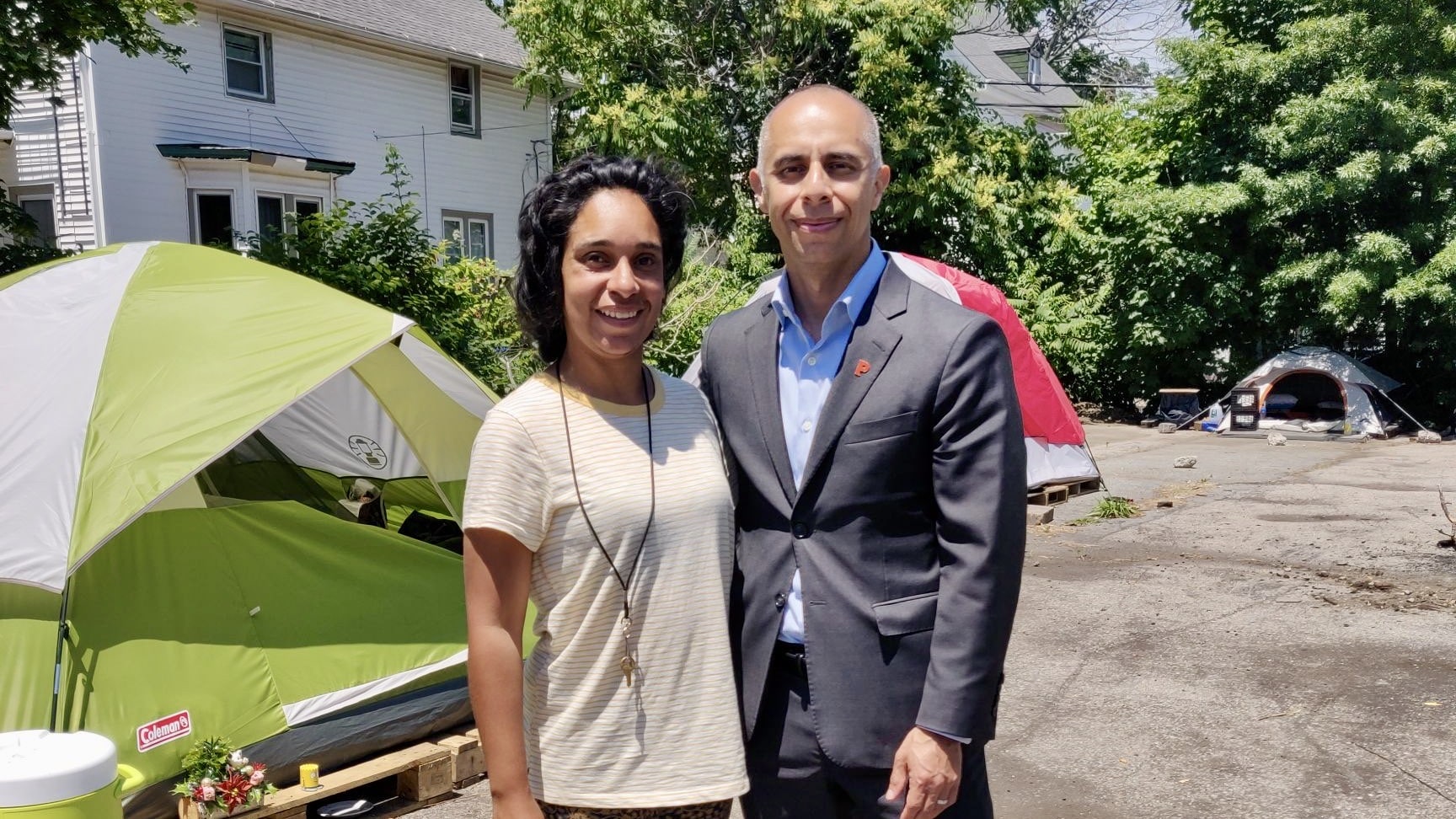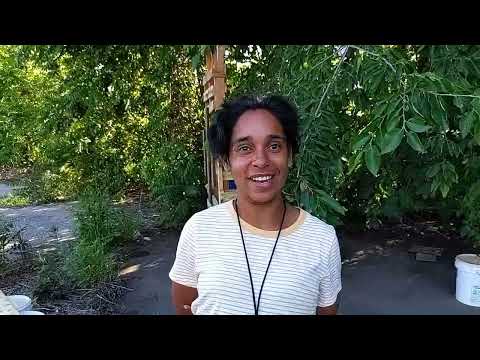Mayor Elorza meets with unhoused encampment leaders
“So the main organizer, actually, we’ve known each other for years and years and years,” said Mayor Elorza. “I know her family. I know her parents. And so part of it is just connecting at a human level. Remember, they’re human beings and we have got to be compassionate when we do this work…”
June 11, 2021, 10:23 pm
By Steve Ahlquist and
On Friday afternoon Providence Mayor Jorge Elorza met with Diumila Almonte to discuss the future of the unhoused encampment and garden that she and others established in Providence’s West End. The Mayor brought Theresa Agonia, his Chief of External Affairs, while Almonte was accompanied by Gregory Waksmulski, a member of the Rhode Island Homeless Bill of Rights Defense Committee. A representative from House of Hope CDC was also present, as were other residents of the encampment.
Mayor Elorza spoke to reporters shortly after the 45 minute conversation. Uprise RI reached out to Almonte and Waksmulski for their account of the meeting. The text below the video merges all three accounts.
Tour the Guerrilla Garden with Diumila Almonte and Will James:
“They told me a little bit about themselves and part of this is just getting to know them at a human level,” said Mayor Elorza.
“It was hopefully a productive meeting,” said Almonte. “But I can’t make a judgment off of words. I am giving the Mayor the benefit of the doubt because this is my first time working with him personally. But unless there’s action, there’s nothing that he says that I should believe. It’s just words to me right now. Now is the time to prove to my community that he’s actually about helping us.”
The Mayor offered those at the encampment three weeks in a Providence area hotel.
“If we get into hotels, what happens in three weeks when we’re done, where are we going to go?” asked Waksmulski. “That’s when Diumila recommended that we shoot for something longer term.”
“The Mayor needs to give us housing or give us a lot to continue,” said Diumila. “A shelter at Crossroads or a hotel is a temporary bandaid and isn’t permanent enough.
“If you move us out of here, put us in a hotel, we’re going to find somewhere else to go,” continued Diumila. “You shut us down here we will find another lot to pick this up from. It’s not going to stop.”
“The Mayor said he would be working with us to make sure that something would be arranged for the campers when they leave the hotel,” said Waksmulski. “That’s when House of Hope, Matilda and another camper reminded him that the shelters are full, that people are out here for a reason. There are waiting lists for housing.”

“I had this conversation with them and I told them that we’re not just going to put them out on the street because this is just going to push the problem to another place,” said Mayor Elorza. “And unless there’s a short-term, mid-term and a long-term solution, all that’s going to happen is if we move them from here, they’re going to end up in a lot on another side of town for another couple of weeks, until we get word of that. So I gave them my word that we’re going to work with them. We’re going to figure out a solution to this. The challenge is that there is no easy solution to it. Again, it has to be a short-term solution, a midterm, and then ultimately a long-term solution.”
“So the main organizer, actually, we’ve known each other for years and years and years,” said Mayor Elorza. “I know her family. I know her parents. And so part of it is just connecting at a human level. Remember, they’re human beings and we have got to be compassionate when we do this work. So we talked about the circumstances inside of the the lot.”
“I’ve known the Mayor since I was four,” said Almonte. “He actually remembered me and everything. Once I started throwing names out there he remembered my sister used to work with him. He knows my family very, very intimately.”
“The mayor asked, to his credit, ‘So what would be enough?,'” noted Waksmulski. “We gave him litany of demands: a parking lot where we could run something similar to this, but on a larger scale. The Mayor said that he would be willing to put pressure on the governor to see if something like that could happen.”
“They also asked me to reach out directly to the governor, which I agreed to do,” said Mayor Elorza, “to talk to him about some of the assets that the state has. And we agreed to continue the conversation, to find a solution. My team is actively working on it and we’re going to continue to be in touch with them with our problem solving hats on.”
“The Mayor asked if there was anything else that he could do for us,” said Waksmulski. “And I asked him if he could work on stopping the repression from the police department. And the Mayor said he would see what he could do. He recommitted at the end to those three basic things. He said he’d want to work with us on a short to medium term solution. He assured us we aren’t going to be hassled until such time as he has a suitable plan. And he said that he was going to talk to the governor.”
“Matilda doubled down on the fact that we were going to continue to stay here for as long as we had to,” continued Waksmulski. “And we were going to continue to accept people.”
“He can’t kick us out because if we don’t move, how is he kicking us out?” asked Almonte. “Sometimes you have got to hold your ground. When it comes to something as serious as what we’re trying to do here, there’s no choice, but to hold our ground.”
“The solution is to make sure we address the lack of affordability, the lack of shelters, the lack of housing for people that need it,” said Mayor Elorza. “This is a major crisis that we’re having in our city and in our state. Look at real estate prices, they’re through the roof, and then you look at services for folks with mental health and substance misuse challenges. Those resources have dwindled over the years. You add that together and we get this – and we’re going to see even more of this unless we get serious about it. I’m going to keep urging that we take a compassionate approach to this at a statewide level. That’s the only way that we’re going to work. That’s the only way that we’re going to get beyond it.”
“I’m not relying on anybody to do anything for us,” said Almonte. “I hope the Mayor is serious about what he’s saying and that he actually can make things happen. But in the meantime, I’m going to keep making things happen for my community.
“We did this all independently,” continued Almonte. “This isn’t your government or any government funding. This is what we managed to create together for our community.
“What we’re doing here is really important,” concluded Almonte. “It’s not just housing, it’s a safe place for somebody to be while waiting for housing. I’m taking the Mayor’s words with a grain of salt until I see action.”
- Unhoused, they banded together. Now their “garden” is about to be dispersed.
- Providence Police search unhoused encampment – threaten arrests
- Given 48 hours to vacate, unhoused encampment in PVD holds press conference
- Mayor Elorza meets with unhoused encampment leaders
- They’ve planted gardens and built a shower. Now the city is ousting them from a vacant lot; Katie Mulvaney
- Providence orders homeless people to leave encampment in the West End; Ed Fitzpatrick







